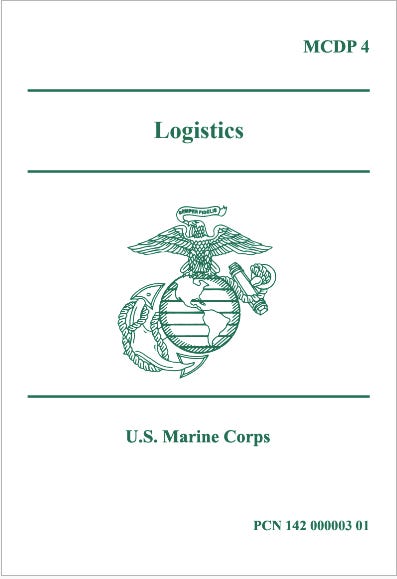MCDP-4 Logistics
"So bad it's not even wrong."
Philosophy appeals to the young and the old, to those looking for a comprehensive map to a world that is still new to them and those making sense of a shapeless mass of information acquired over the course of five or six decades. Practitioners in the middle years of life, however, prefer pedestrian pronouncements. If honest craftsmen, they want to know what they need to know to solve the problems in front of them. If craven careerists, they covet cognizance of “the latest thing.”
Many illustrations of this phenomenon can be found in the many critiques of Warfighting published over the past thirty-three years. The authors of these pieces made few, if any, comments about the validity of the philosophical points promulgated by this little book. Rather, they complained about the absence of detailed instructions. “Enough about ‘nature’ and ‘character,’ they cried, “tell me more about enfilade, defilade, and (most of all) hand grenade.”
When confined to the pages of the Marine Corps Gazette, this point-of-view does little damage. After all, such complaints are easily answered by pointing to the hundreds of manuals, many of which are easily found on the internet, that deal with such matters. When, however, a committee composed of people possessed by the “middleman mentality” get involved in the writing of a little white book, they attempt to dress the promotion of particular plans, policies, and procedures in the language of philosophy. The result, alas, is neither timeless truth nor information of value in specific situations, but a text that, to borrow a phrase from Swiss physicist Wolfgang Pauli, is “so bad that it’s not even wrong.”
This, I fear, is what happened with the recent rewrite of MCDP-4: Logistics. Rather than dealing with aspects of logistics that are either inherent in its nature, or slow to change, the manual provides readers with a long series of statements that are so comprehensive as to be immune to falsification. In other words, the great bulk of the content of the new MCDP-4 is so banal that readers will often be reminded of the irrefutable proposition that every book has a beginning, a middle, and an end.
Notwithstanding the absence of meaning, the word count of the new version of MCDP-4 exceeds that of its predecessor by a good twenty percent. Some of this increase is a function of vignettes, short works of fiction that provide readers with welcome respite from the frustration of attempting to find meaning in the main text. Most of the excess wordage, however, results from the many hat tips to such pre-existing exercises in vacuity as the “continuum of conflict” and the “seven warfighting functions.”
To put things another way, the latest iteration of MCDP-4 resembles the sort of welcome speeches that one often encounters at academic conferences, talks in which the essential thing is the mention of anyone in the room who might be important. Indeed, this feature provides the new MCDP-4 with what little value it might have to the student of military institutions. While useless for any other purpose, it provides a handy guide to the clichés, bromides, and buzz words of the era in which it was written.
Note: I wrote much (but not all) of the text that was published in the predecessor (FMFM 4: Logistics, 1993) of the manual (MCDP-4: Logistics, 1997) replaced by the work reviewed in this post.





Bruce! I love it! "Vignettes... provide readers with welcome respite from the frustration of attempting to find meaning"
I am still of the opinion there are only 2 MCDPs ever worth actually reading: MCDP 1 and MCDP 3. Everything else is just fluff